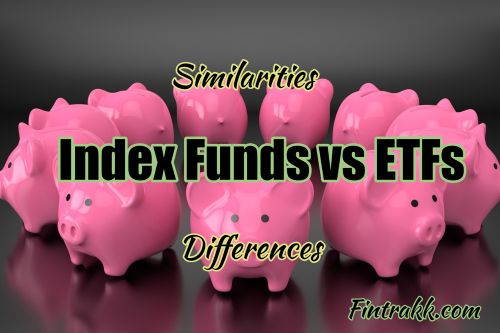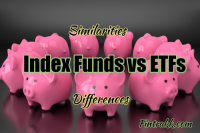Index Funds and Exchange Traded Funds (ETFs) are the most discussed financial products among investors due to their similarities in investment strategy. But, actually these are very much different in use and applications. Here, you shall get to learn in-depth details on Index Funds and ETFs, their important features and similarities between these investment alternatives. A comparison of Index Funds vs ETFs has also been done in a simple manner to make you know the difference between these two types of mutual funds in India.
Before discussing the differences between ETFs and Index funds, let’s have a look at some of their similarities.
Index Funds vs ETFs: Similarities
- Indexing: Index Funds and ETFs both share common investment strategy of “indexing” because both funds involve investing in the constituent shares of their respective tracking index.
- Passive Management: Both funds are passively managed to mean it does not involve research and stock picking by fund managers. They are not designed to outperform their index and no adjustments are required in the fund’s portfolio unless it has been performed by index.
- Eliminates Fund manager’s risk: Both funds eliminate the risk related to management of fund as against actively managed mutual funds.
- Low expense ratio: This is because of the passive style of management. The fund manager in Index funds does not require research for selection of stocks and building portfolio.The investment in securities is determined by the index. Also, there will be less adjustment of the portfolio which will help in reduction of brokerage and transaction cost.
- Taxation: Taxation rate for Index Funds and Index ETFs are similar except for Gold and International. Short-term capital gains are taxed at 15%. While Long term Capital Gains on mutual funds have also been brought under the tax ambit recently. LTCG on any equity oriented funds that used to be NIL earlier, now it is chargeable to tax @10% in excess of Rs.1 lakh (without indexation benefit).
Index Funds vs ETFs: Differences

1. Fund structure:
Index Funds are open-ended mutual funds wherein the fund manager can create new units. On new investment to the fund, the fund manager buys the underlying shares at the same weight age that comprise the index.
On, the other hand ETFs are close-ended funds, which are listed and traded on stock exchanges like a common stock. Investors can buy/sell ETFs from the exchange.
2. Pricing and Transaction:
Just like any mutual funds, pricing of index funds are done after the market hours. Any new purchase and sale of index funds are executed on previous day’s NAV.
As ETFs are traded like a common stock on an exchange as a common stock and price discovery is done in real time basis. Buying and selling of ETFs are carried throughout the trading session and fluctuations of price is affected by market conditions. One can also take intraday positions in ETFs.
3. Tracking Error:
Index Funds might be subject to tracking error. It happens because of the adjustments in portfolio due change in the composition of index and liquidity factor. High degree of deviation of return against index return results in inefficiency in managing the fund.
In comparison to index funds, ETFs have a very less tracking error for their fund due to its effective management and they don’t have to keep liquidity for the fund. They invest 100% of their holdings in the equities.
4. Portfolio Disclosure:
Index Funds disclose their portfolio holdings on a quarterly basis whereas ETFs disclose their holding on a daily basis and is considered more transparent than index funds.
5. Dividend Policy:
Index Funds need to adjust the dividend declared by underlying securities to get adjusted to the price as and when received.
For ETFs, the dividend received from the underlying securities are accumulated and is distributed to the shareholder on pro rata basis after each quarter.
6. ETF vs Index Funds: Liquidity
Index Funds are the most liquid funds in mutual funds. The shares held in the portfolio belong to the high market cap which is traded with high volumes in exchanges.
All ETFs are so popular do not generate high trading volume. This affects liquidity in the fund and results in increase of bid-ask spread.
7. How to invest and Expenses involved:
One can invest in Index Funds through Agents, Online portal or from direct AMC website. Index fund includes management expense, exit load if the investment is liquidated within stipulated time (generally 1 yr).
Investing in ETFs are done through Trading Account. It does not include any entry or exit load. The only brokerage charges are applied on the investment just like any common stocks. The expense ratio on ETF funds ranges from 0.1-0.5% which is adjusted to the price.
8. Applications:
Investing objective for the index fund is wealth creation over a long term period whereas ETFs provide an opportunity for Long term investment, Trading, Arbitrage, Hedging etc for the different class of investors and traders.
Index Funds vs ETFs Comparison: Summary
For a quick review, the difference between Index Funds and ETFs has been summarised in tabular form:
[table id=69 /]
If you are planning to invest in mutual funds in India, you need to aware of the basic financial concepts. A knowledge on types of mutual funds is a value addition when it comes to building a good financial portfolio.
Now, you know the difference between Index funds and ETFs (Exchange traded funds). Which investment option do you prefer? Do you like exploring new long term investment opportunities or you are satisfied with fixed income generating sources only. Do share your valuable feedback in the comment section.
